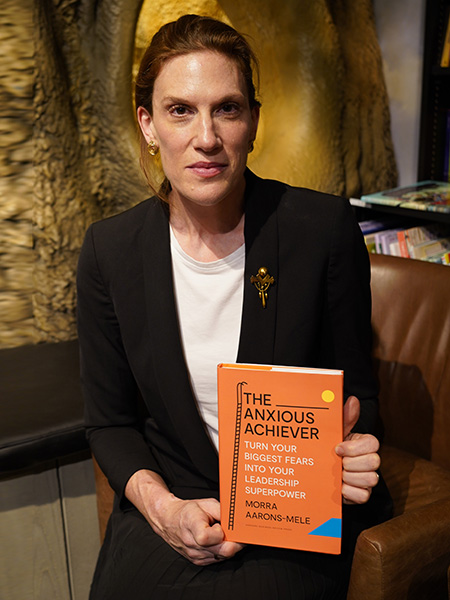
Anxiety can be turned into a leadership superpower: Morra Aarons-Mele
Real leaders need to be vulnerable, authentic and skilled at driving their teams through challenging times, says the author of The Anxious Achiever. She reframes how we think about anxiety in the context of leadership and organisations
 Morra Aarons-Mele, author of The Anxious Achiever
Image: Erykah Chanel
Morra Aarons-Mele, author of The Anxious Achiever
Image: Erykah Chanel
Q. How do you perceive the link between anxiety and leadership?
Anxiety is an emotion. And whether you have been anxious since birth (like me) or you are managing through challenging times, anxiety is a part of leadership. It is not an external threat over which you have no control, but an internal state you can learn to manage and learn from. When you understand your anxiety and learn how to leverage it, you develop a leadership superpower. When you are attuned to your emotions and what they are trying to tell you, you become a self-aware, conscious and a thoughtful leader.
I wrote this book because my own anxiety propels me forward, but it’s painful and sometimes all-consuming. I call us anxious achievers. Anxious achievers are goal-oriented, future-oriented and prized team members because we go the extra mile, and nothing less than the best will do.
Q. You write: “Anxiety at work is a double-edged sword.” Why do you think so?
When unmanaged, it can be a destructive force—as overwork, perfectionism, micro-management, unhealthy diets, drinking or substance use all impact today’s workplace experience. But if harnessed constructively, it can be a catalyst for growth, helping channel superpowers like greater vision, empathy and communication skills.
Q. How does an anxious leader cope with the emotion?
To an anxious leader, control feels so good. It’s such a human response if you think about it. It’s our brain trying to protect us. As Dr Christine Rynyan says in the book, we evolved as humans to stay alive. All those systems in our brains still exist. And when we feel that things are uncertain and scary, all those chemicals and hormones kick in. We get anxious. But along the way we learn coping mechanisms. And control is really a coping mechanism a lot of us have when we get anxious. Three common ways we act out an anxious need for control are perfectionism, micromanaging and overwork.
The problem is: The relief is temporary and once it wears off, whatever was making us anxious is still there—and often, it’s grown worse while we were avoiding it. Ironically, unhelpful reactions can help people advance in their career. Overwork, for example, is frequently lauded, and its results rewarded.
Q. How can leaders stay clear of ‘thought traps’?
A thought trap is a negative piece of either self-talk, self-criticism feedback or an instant reflexive thought that happens when you are triggered—when you are made anxious or concerned about something. A classic one is catastrophising, jumping to conclusions, feeling like an imposter, feeling like you are not worth it, and “should” statements.
If all you can think is, “I’m a fraud and any day now people will find out I actually don’t know what I’m doing”, your self-confidence is going to plummet, and your anxiety will escalate. And from there, the thought trap will influence your behaviour. You can offer an alternative to your thought trap, called a balanced thought.
For example, if your thought trap is ‘all or nothing’ thinking… “Because I messed up the numbers on that slide, my team will lose respect for me”, a more balanced thought could be: “Yes, I got the projections wrong. That was embarrassing. But it’s the first time in three years I’ve ever done something like this. It’s not a big deal in the long run and it was only an internal team presentation. Overall, my staff really trusts me, and I know this because I saw my recent 360 review.”
How to free yourself from the traps? It takes practice, more balanced thoughts, moving around (yes, really), allowing others to help you and other simple, research-based actions.
Q. Why do some of us develop an ‘imposter syndrome’?
For many of us, especially those of us with anxiety, impostor feelings are difficult to turn off like a switch. It’s not that easy because they tap into our deepest feelings about self-worth and belonging.
Often, these are based on long-held stories we tell ourselves. We have pushed ourselves very hard, all our lives, and when we are faced with challenges, we feel anxious. For a lot of us, the story that we are not good enough and we don’t belong and we must absolutely work harder than everyone else can be deeply held—even habitual. The causes are so varied. It could be because we have been an “other” or an “only” in systems, organisations, teams and offices that treat us like we don’t belong.
Sometimes we belong to the privileged class, but we still feel anxious, and feel like we don’t belong or we are not good enough. I believe imposter syndrome is rooted in anxiety, anxiety that turns into habitual thought traps. In my podcast, I have interviewed many high achievers who have operated from a system of feeling like an impostor or a failure, and then use that anxiety to push themselves ever harder. This takes a toll, but can drive achievement.
Research has even found that people with impostor feelings become “more other oriented” and are collaborative, socially skilled, and effective in teams. We humans are good at adapting. With therapy, we can reduce the impact of impostor feelings—but we still need to change the systems that create and foster them.
Q. How debilitating is social anxiety?
So here’s a secret: If I ever picked up the phone to call you, I’d probably dread it. In fact, I’d possibly have cancelled our call—and then rescheduled it a million times until you gave up trying to contact me. It’s not personal: It’s my social anxiety.
And social anxiety is strange. It makes no sense. Many of us can stand up in front of thousands of people and deliver a killer keynote address or stand-up set. But if we need to mingle with a few people afterwards, we become riddled with anxiety and run to hide in the bathroom. This phenomenon is what the Australian comedian Jordan Raskopoulos calls a “shy/loud”.
When you have social anxiety, you can pay a price: At work, in networking, and even in your personal relationships. Silicon Valley veteran Arvind Rajan, former executive at LinkedIn, the mothership of networking, has social anxiety. “I can speak in front of 2,000 people with no problem, but if there’s a chit-chat session after, I get anxious and drained.” Arvind has learnt that, for him, structure is key to his comfort level.
Q. Does a leader necessarily have to be a people person?
Leadership in the future will be the polar opposite of the old command and control model—a guy talking in front of the room. Real leaders will be human above all. They will be vulnerable, authentic, but skilled in building a holding environment that brings their teams through scary times.
There are two mindset shifts needed: One is to give up pretending that you, as leader, need to know all the answers. If you pretend you know the path forward in a post-Covid world, no one will believe you. Instead, you need to become a skilled and trustworthy guide as everyone navigates new territory. The second competency is learning to communicate better so you can help your people manage through uncertainty. This involves sharing the right amount of vulnerability while also reassuring your team. You can’t promise anything, and you don’t have a crystal ball. But you are still in charge, and so you are going to put all your best skills and best efforts forward to help find a way.
Author bio: Morra Aarons-Mele is the host of The Anxious Achiever, a top leadership podcast and founder of Women Online, a digital consulting firm. She is also the author of The Anxious Achiever: Turn Your Biggest Fears into Your Leadership Superpower

















